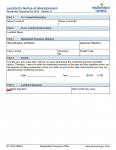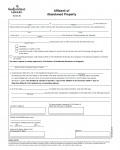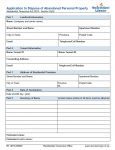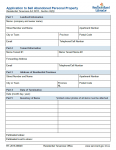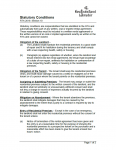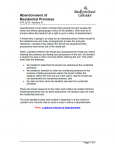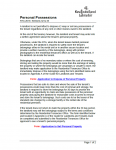Landlords that believe a rental unit has been abandoned must follow a process outlined in the Residential Tenancies Act in order to enter and take possession of the rental unit.
Before a landlord can consider a rental unit abandoned the tenant needs to have moved out without the rental agreement being properly terminated and rent must be overdue.
The first step a landlord needs to take in order to regain possession of an abandoned rental unit is to post a written notice in a clearly visible place at the rental premises. The most common way of doing this is by posting the notice on the door.
The landlord’s notice must be in writing, on paper, and state that the landlord believes that the rental unit has been abandoned. The notice must be posted at the premises at least twenty-four hours before the landlord enters the rental unit and contain the day and hour that the landlord plans to enter the rental unit.
The notice must also state that the landlord plans to enter the rental unit to take possession of it unless the tenant notifies the landlord that the rental unit has not been abandoned. The notification from the tenant does NOT need to be in writing.
If a landlord is notified by a tenant that the rental unit has not been abandoned the landlord shall not enter the rental unit.
Abandoned Property
When a tenant’s personal property has been abandoned there are rules that the landlord must follow.
Landlords are required under the Residential Tenancies Act to either remove any abandoned property and place it in safe storage, or safely store the abandoned property at the residential premises, for at least thirty days. The landlord must make an inventory of property that has been placed into storage and provide a copy of the list to Service NL. If the landlord knows an address where the tenant can be reached, then a copy of the list should also be provided to the tenant as well.
Landlords are not required to store abandoned property in all cases. Landlords do NOT need to store anything that is of no monetary value, or anything that is unsanitary or unsafe to store. Landlords also do not need to store property in cases where the value of the property, if sold, would be less than the cost of removal and storage of the items. In these cases, the landlord can ask Service NL for permission to dispose of the property.
Reclaiming Personal Property
A tenant or owner of abandoned personal property can reclaim their property at any time during the thirty-day storage period by paying the landlord for the reasonable cost of removal and storage of the property. Where a landlord stores personal property at the residential premises, the storage costs charged to reclaim the personal property shall be the standard rate charged by public storage facilities, or the rental rate of the residential premises, whichever is lower.
A landlord cannot hold personal property hostage for any reason, including unpaid rent. If the removal and storage costs have been paid the landlord must return the personal property. If the landlord believes they are owed money for things like unpaid rent or damages, they should file a claim with Service NL.
When a tenant reclaims abandoned property, the landlord should notify Service NL as soon as possible.
Sale of Abandoned Property
If a tenant does not reclaim abandoned property within thirty days, the landlord may ask Service NL for permission to sell the items. When abandoned property is sold the landlord is permitted to keep enough money to cover the costs of removal and storage of the items, as well as any money the landlord is owed as a result of a successful claim with Service NL for things such as damage or unpaid rent.
Once the items have been sold the landlord must notify Service NL, along with the amount the items were sold for. Any amount above the cost of removal and storage, and any money the landlord is owed as a result of a successful claim against the tenant, must be paid to Service NL in trust on behalf of the tenant.
If the sale of the property resulted in funds being paid to Service NL in trust, as mentioned in the previous paragraph, the tenant can file a claim with Service NL within a year of the property being sold to have that money returned to them.
Here are a couple of examples to help illustrate this better.
If a tenant leaves $200 worth of personal items behind, and the cost to remove the items and store them for thirty days is $250, the landlord could apply to Service NL for permission to dispose of the items because the value of the items is less than the cost of removal and storage.
However, if a tenant leaves $1000 worth of personal items behind and the cost to remove the items and store them for thirty days is $300, the landlord would be required to store the items for thirty days. If the items are not collected by the tenant within those thirty days, the landlord could sell the items. The landlord would be permitted to keep $300 to cover the cost of removal and storage and would have to send the remaining $700 to Service NL. The tenant could apply to Service NL within one year to claim the $700 they are entitled to for the sale of their belongings.
Minimizing Losses
In cases where a rental unit has been abandoned, the tenant may be liable for any losses or harm suffered by the landlord as a result of the tenant’s breach of the Rental Agreement. However, landlords are obligated by law to minimize their losses as much as reasonably possible.
For example, if a tenant signs a year-long Rental Agreement on January 1 but moves out 2 months early on October 31, they are still responsible for paying the rent for the months of November and December since their Rental Agreement didn’t expire until December 31.
However, the landlord cannot just leave the rental unit empty for those two months with the expectation that the tenant is responsible for paying it anyway. The landlord would need to try to re-rent the unit to a new tenant in order to minimize their losses. If the landlord does reasonably try to re-rent the unit and is unsuccessful, the tenant that violated the Rental Agreement would still be responsible for paying the rent for November and December.
The reason for this is that if the tenant didn’t violate their Rental Agreement and move out early the landlord would have had rental income from the rental unit for the months of November and December that the tenant had already agreed to pay. Since the landlord tried to re-rent the unit, and was unsuccessful, the tenant would be responsible for paying the rent for the time they had agreed to in their Rental Agreement.
Tenants that have signed a fixed-term Rental Agreement, like a year-long lease, would only be responsible for paying the rent up until the time it was re-rented, or their Rental Agreement would have expired, whichever is earlier.
Tenants that are renting month to month and have not signed a fixed-term Rental Agreement, would only be responsible for paying the rent up until the time it was re-rented, or their Rental Agreement could have been terminated had the tenant served a valid termination notice, whichever is earlier.
Let’s say, for example, that rent is normally due for a tenant on the first day of the month, and the landlord realizes on September 20 that the rental unit has been abandoned. Normally if the tenant wanted to terminate the Rental Agreement, they would have needed to provide proper notice on October 1, and the Rental Agreement would have been terminated on October 31. In this case the tenant would be liable for paying rent up until October 31 unless the rental unit was re-rented to another tenant before that date.
Double-Dipping
A landlord is not allowed to collect rent from two tenants, for the same rental unit, covering the same period of time. For example, if a tenant abandons a rental unit early but the landlord is able to find a new tenant for the following month, the landlord would not be able to file a claim against the original tenant for unpaid rent for any period of time that rent was also being paid by the new tenant.


